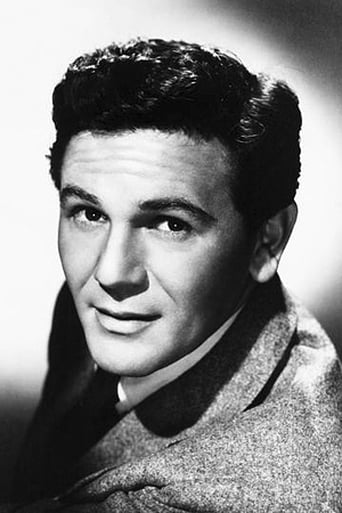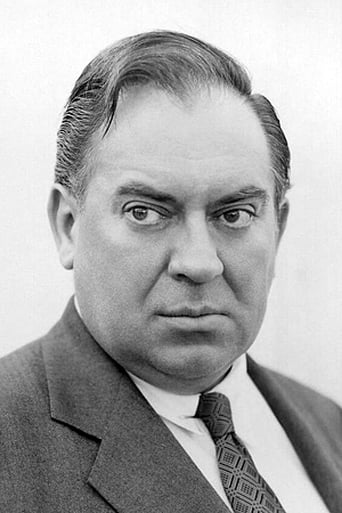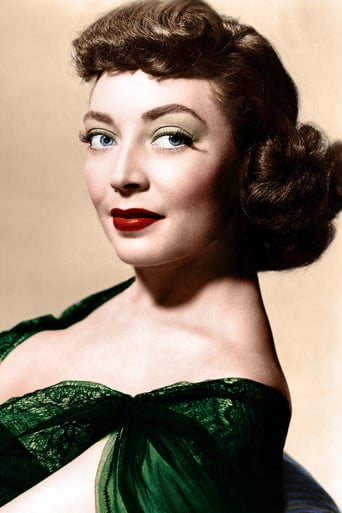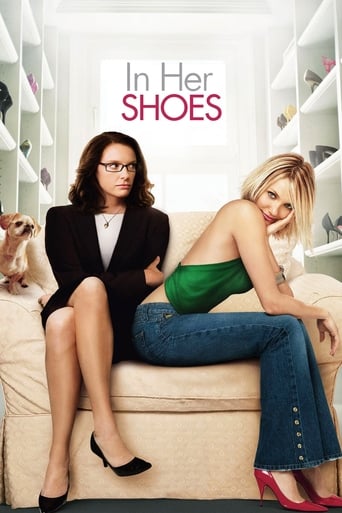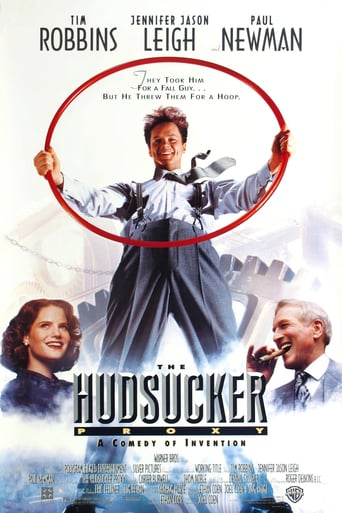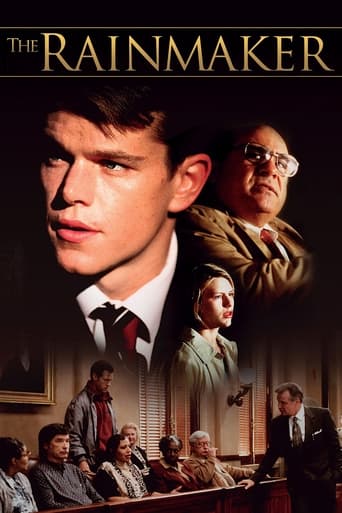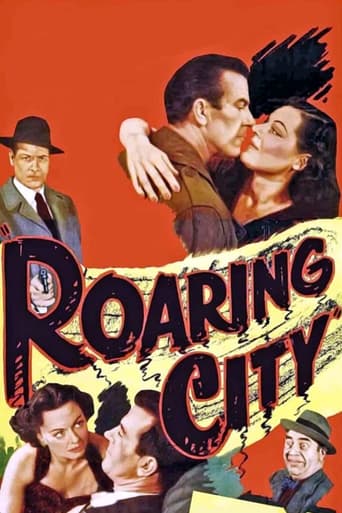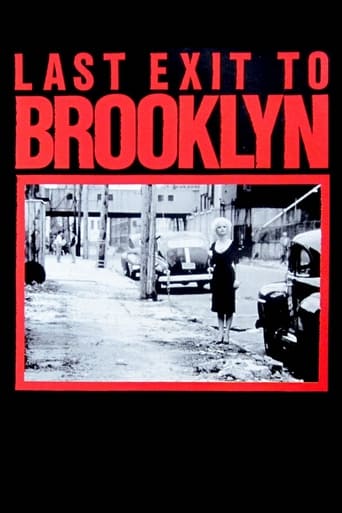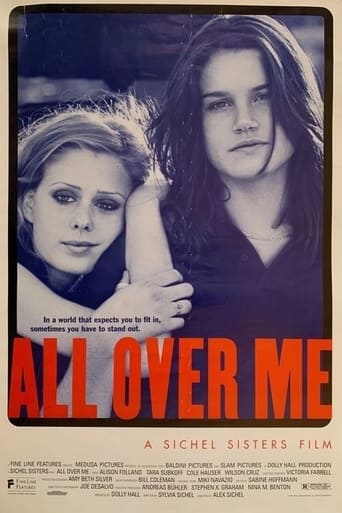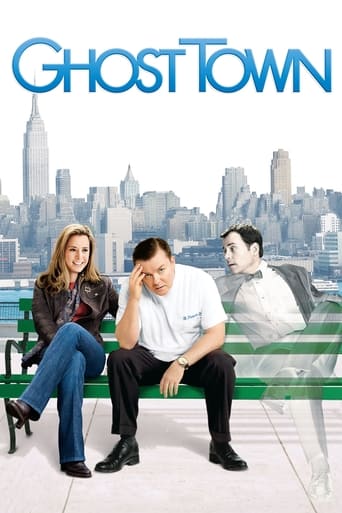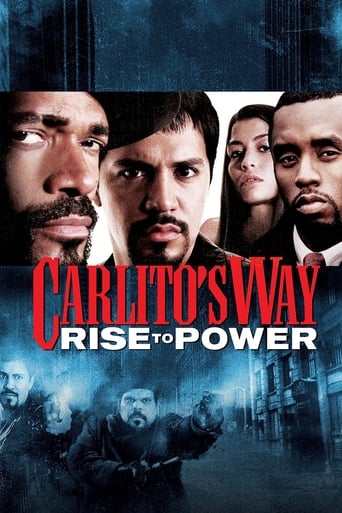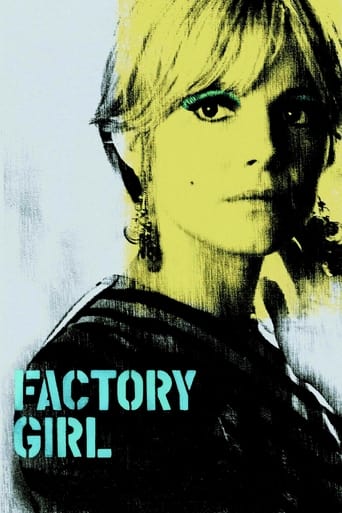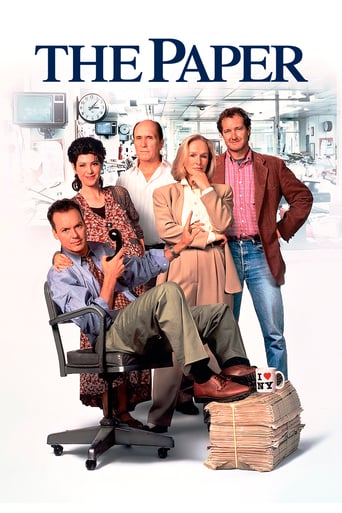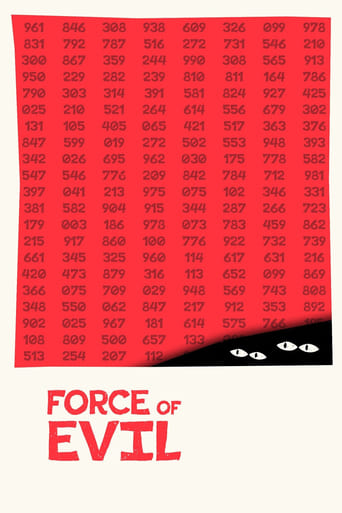
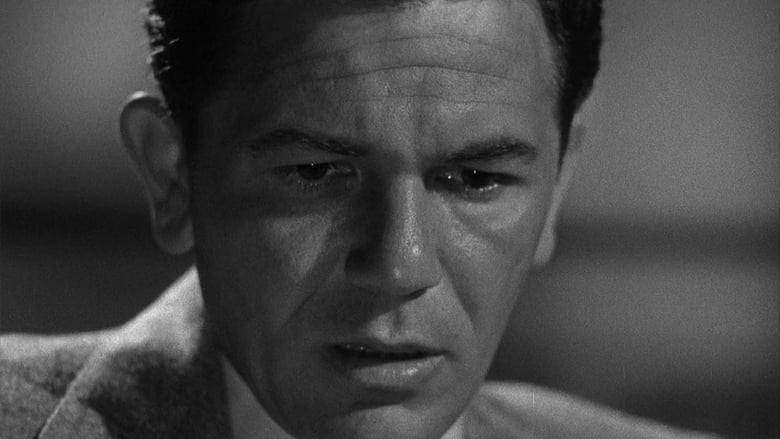
Force of Evil (1948)
Lawyer Joe Morse wants to consolidate all the small-time numbers racket operators into one big powerful operation. But his elder brother Leo is one of these small-time operators who wants to stay that way, preferring not to deal with the gangsters who dominate the big-time.
Watch Trailer
Cast


Similar titles
Reviews
A richly provocative movie that could serve as a bible of film making, "Force of Evil" succeeds on a number of planes , establishing itself not only as classic noir, but as a reflection of its period. Visually, the compositions are exciting, from the elegant decor gilding the halls of power to the closeup of horror that punctuates Bower's brutal murder, the rich complexity seldom falters. There are echoes here of Eisenstein, and one can't help noticing the presence of Robert Aldrich as Assistant Director, an apprenticeship that would payoff in the visually similar "Kiss Me Deadly", suggesting that Aldrich served for a time as trustee of the blacklisted Polonsky estate. The script occasionally rises to the level of poetic Blank Verse, and is expertly intoned by John Garfield, Beatrice Pearson, and Thomas Gomez in a sweatily memorable performance.Thematically, Marxist Polonsky and co-scripter Ira Wolfert take a shot at the Darwinist world of capital, where big fish survive by eating smaller fish or by muscling in on the catch (Ficco's strategy), while working class minnows offer up dimes and quarters in hopes of instant metamorphosis. It's an ugly world where corruption and greed reach from top to bottom. Since the Production Code of the time couldn't leave matters in an unregenerate state, an upbeat ending is tacked on that defies the logic of what has gone before. Nevertheless, the sharply-etched images remain, vividly - memorably. And it's ironic that any intended remake will have to consider that the biggest fish of all has taken over the numbers racket and renamed it - the State Lottery. I wonder if Polonsky was amused.
A corrupt lawyer Joe is hired by a rich gangster. A scam is concocted to ensure that all of the small numbers banks in New York will be bankrupted, leaving the way open for the gangster's syndicate to move in and buy them over. Joe's elder brother Leo runs one of these numbers banks, so Joe feels compelled to warn him of the situation which in turn puts him in an extremely compromised position.Under the surface, Force of Evil was an allegory of the corrupting nature of capitalism. All of the characters go thorough moral dilemmas and change their positions due to the possibilities of monetary gain. The way that big business works in a very underhand and amoral way in this film was meant as a comment on how actual business practises in post-war America could often be somewhat nefarious. The movie itself was not successful at the time. It may have been because of these themes but it might simply have been that this was a pretty complex movie that doesn't have clear heroes or villains. This very ambiguity has made it more cherished as the years have gone by but most probably contributed to it not being box office dynamite at the time. Force of Evil has, therefore, gone on to become one of the cult movies of film-noir.The acting and script are very good. But so is the look. There is some great New York location photography, particularly in the final third. While good expressionist use is made of light and shade. So, in summary, this is a serious-minded film-noir with a well crafted aesthetic. It's certainly a less well-known example of the genre but it's definitely one with quite a bit more going on under the surface than most.
Morally confused 'bank manager' Leo Morse brought up his younger brother Joe when their parents died only to see him wind up working for the Corporation, a criminal organization headed up by evil Ben Tucker, a man with no moral scruples but only a love of money. Now black-suited devil's advocate Joe is acting as older brother to Leo, offering him a step up the ladder from his skid-row office to manager of thirteen 'banks', or number rackets, in the New York area. But Leo wants out even though he can't deny that he got his little brother through law college on the scraps of dirty money from the same piles of dough he's offering him now. The nosiness of a city hall litigator called Hall may have something to do with his reluctance to climb the ladder with his brother. On the other hand, there is the angelic young teller Doris Lowry who only worked for the bank to feed her family. She wants out too. Joe has to fight for the approval of his 'older brother' Ben Tucker and his wife Edna (a femme fatale of sorts) as well as that of his older brother Leo and femme vivante Doris.As a man who has never read the Bible, I can still relate to the tragic outcome of Joe and Leo's fraternal conflict. Polonsky's street knowledge and George Barnes' Edward Hopper-influenced photography really take advantage of an isolated Wall Street (how they swung that I do not know) in which John Garfield's unusually white-suited Joe walks out from under the hand of George Washington and into the morning light beyond a church tower. Redemption is what he's seeking, in the arms of Doris.As a capitalist, I can also watch this movie and still enjoy it as it lays on Polonsky's left-wing rhetoric quite lightly, unlike more recent heavyhanded Hollywood propaganda. Innocent people aren't punished in this picture, only the ones who knowingly got involved in the 'numbers racket' are (ergo Leo and Freddie Bauer). The numbers racket will essentially break the bankers and force them to be bailed out by Tucker's Corporation. As one character says, "What do you mean gangsters? This is business!" Something quite relevant to our times, many would agree.Unusually for a film noir of it's time, 'Force of Evil' doesn't end with a shot of the cuffs being snapped on Garfield's wrists or the bulb going on and off for the electric chair -he awaits his jailers peaceably, aware of his bad deeds, instead of shooting it out with the world as in most gangster pictures. Nor is the femme fatale a major presence.Characters' worth in the picture is really merited on their expediency, not on their goodness as we find out in the end when the short-lived dispute between Tucker and his old Prohibition partner Ficco boils over to Leo who "dies even when he's breathing" and his weary bookkeeper Bauer in a memorably hardboiled sequence. World-weary numbers man Leo is found "on the rocks... by the river... like an old dirty rag nobody wants" but Joe wasn't expedient enough to be played by the Corporation and gets out. As the testing Edna Tucker might have said, "You're not strong or weak enough."
Cards on the table, John Garfield is probably my favourite movie actor bar none and this gripping late 40's film noir benefits yet again from another bravura performance by its star. That said, this movie also benefits from some great supporting roles particularly Thomas Gomez as Garfield's more honest older brother and Howland Chamberlain as Bauer, a little cog in a big wheel who won't go along with the mob and pays a heavy price for his conscience.Garfield's nattily dressed ambitious young lawyer casts no shadow in his pursuit of riches, nailing his colours to the mast of big-time racketeer Tucker, but never quite forgetting his obligation to his workaday brother Leo, who you suspect doesn't work his own small "numbers" operation for personal gain, but almost as an altruistic obligation to his neighbours a motley crew of which he employs as his staff.Both brothers worlds have to collide and pride will lead each of them to a downfall before the end. There's some love interest for Garfield, new face Beatrice Pearson, effective as Garfield's brother's young ward, falls for Garfield's looks and tough charm, her innocence and morality contrasted with Mr Big Stuff Tucker's wife who attempts to use her more worldly wiles to ensnare Garfield in her own designs.The story races along, punctuated by some superb camera set-ups, some of the city-scapes especially memorable, equally sharp dialogue and some abrasive for its time, on-screen violence - Bauer for example meets his end by getting shot point-blank in the face.In summary, a densely plotted, brilliantly characterised noir which smacks of low-life realism throughout.


